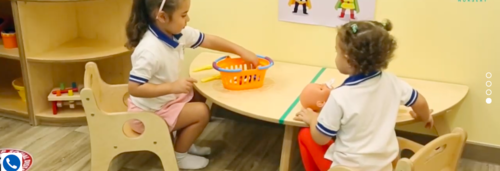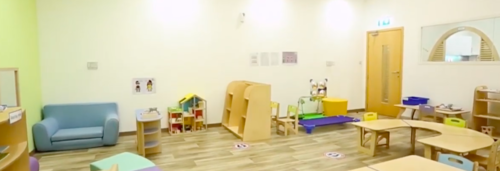
Best Kidz has implemented Finland's Early Childhood Education in Dubai
“We follow Finland’s National Curriculum for Early Childhood and Care. Learning happens when children play and explore together. The educators document the children’s play, as observation of the play gives a lot of information about children’s world, their thoughts, interests, emotions, and experiences. "
In an exclusive interview with Edarabia.com, Maryum Nawaz, Nursery Development Manager at Best Kidz Nursery – B.E.S.T. Education Group, shares why quality early childhood education is important.
Can you tell us more about your session at IPSEF, “Lifelong learning begins in Early Childhood – Finland’s approach to early years education?
I was invited as a speaker at the IPSEF event in RAK focusing on the topic of future schools and future citizens. My presentation addressed the importance of Early Years education in promoting lifelong learning and the importance of building a solid base in the early years for positive lifelong learning and well-being to foster caring, capable, and responsible future citizens.
As early years professionals we have a vital role in how we communicate, observe, listen to, support, encourage and care for young children, as well as the kind of learning opportunities and environments we offer children in their early years
I also discussed the importance of ‘play’ as a working method that is used in the Finnish approach to early years education and the value of ‘play’. In the short and long term, play benefits cognitive, social, emotional, and physical development. When play is fun and child-directed, children are motivated to engage in opportunities to learn.
An educator’s guidance and professionalism are required to reach its purpose which highlights the importance of highly qualified educators who understand children, their needs, and learning styles. I then moved on to discussing Best Kidz Nursery Group, licensed by MOE under Finland’s Early Childhood Education and Care curriculum, and why we chose to bring Finland’s early years curriculum to the UAE. Finland’s early years' education focuses on building soft skills in children from an early age. This approach to learning leads to the development of lifelong learning skills.
Lastly, I addressed the importance for nurseries to provide high-quality education, well planned pedagogical activities in order to prepare children for the 21st century challenges and build the skills they will need to prepare them for the ever changing and unpredictable future.

How does Best Kidz Nursery promote positive learning?
Our curriculum follows Finland’s National core curriculum for Early Childhood Education and Care (2016). We focus on a positive attitude towards learning, as well as learning to learn skills that children will need in the future. Learning happens when children play and explore together in a positive way with meaningful interactions. We ensure that learning and teaching are connected to the children’s natural ways of acting so there is a lot of playing, physical activities, exploring, and self-expression through child-led and child-initiated activities. We have a holistic approach to education and care and the aim is to promote well-being as well as learning. Good care and education which are planned for the child’s interests and needs create the best learning opportunities for a child. Emphasis is given to the interaction and building up close relationships with each child, which helps to facilitate learning.
Children have a flexible daily program that focuses on exploring the environment, getting experiences, playing, and exploring as much as possible. Learning situations, solutions, and environments change according to the day, and activity and according to the child and we ensure rich learning environments to promote learning. We ensure good quality of interaction in a peer group, individual play, small group, and large group which facilitates equality and equity in learning. By playing together in small and large group activities, children participate and become a member of a group. Positive emotions and learning experiences in a peer group support learning more.
Play is used as a working method and a way to learn. At our nursery, every child has an Individual Education and Care Plan, which gives goals for adults to plan learning environments and activities and allows feedback to educators so the children have an active role in their learning. The educators document the children’s play, as observation of play gives a lot of information about children’s world, their thoughts, interests, emotions, and experiences. Our educators are learning by observing children, so they can provide the earliest possible support when needed, so we focus more on adult self-assessment rather than child assessment.
Our approach allows us to support inclusive education, as the child’s developmental and learning needs are supported as required and assessed regularly in our nursery program. Since the ‘child’ is the focus, his or her need for support can be recognized and appropriate support arranged. Specific learning difficulties can be detected at an early age through careful observation of their behavioral and developmental pattern. Early detection and corrective measures may promote the child’s development so each child feels equal and a member of the group. Professional support is available to draft a plan to address the developmental needs and support required for children with learning difficulties.
Documentation, evaluation, and development are very important as it is required for high-quality pedagogical activities. The aim of pedagogical activities is to promote children’s learning, well-being, and transversal competence which are the future skills children will need. This approach to learning leads to the development of lifelong learning skills which are the essential skills that children will need in the future- 21st-century skills. A child learns how to learn and become a confident learner and they start to understand themselves as learners, promoting positive lifelong learning!
How can early childhood educators establish effective relationships with parents to offer children the best possible learning experiences in school, at home, and in community settings?
Research shows that 80 percent of what is important in a young child’s development happens in the home environment. Therefore, involving parents helps in supporting, delivering, and understanding the importance of early education is vital. As parents and the family as a whole are integral to a child’s total development, it is essential to us that we work in close partnership with the families.
We believe in parents as partners and we work in close partnership with parents. Parents are encouraged to be involved in planning their child’s education path – this helps their child to achieve the best learning possibilities. This partnership is a commitment by parents, with educators to collaborate for supporting children’s growth, development, and learning. It requires mutual trust, respect, and equality. The partnership is built on the child’s needs, best interests, and rights and also takes into consideration each family’s individual needs and contributes to drawing up the child’s individual education and care plan. Parents and educators sit together regularly in order to discuss and review their child’s plan.

How can the government and academic institutions work together to regulate and monitor childcare quality to empower children and account for their diverse needs?
Over my last 10 years in the UAE working in education, I have seen the development of early years education rapidly improved. There are many advances from governing bodies and their positive reinforcements to improve childcare quality, building a stronger foundation for children.
The Ministry of Education were very supportive of us in the whole process of our academic plan in introducing a new curriculum and best practices from Finland to UAE nurseries. With the updated regulations and thorough inspections for academic planning and execution, nurseries are following the same guidelines and child-care centers are now ensuring their standard of education provided is of a higher quality.
To empower children and account for their diverse needs, academic institutions can also focus more on the importance of values, attitudes, skills, ethics, and diversity, offering children information on ethics, world religions, and helping children identify with people from different cultures and religious backgrounds. The goal is for each child to receive support in their personal growth and identity formation. There is always room for improvement, in these fast-changing times, we need to adapt quickly to suit the diverse needs of children. Educational professionals can collaborate more often and discuss, as well as share best practices with each other, working together with governing bodies. We can address and discuss challenges in order to find the best solutions and work in cooperation with all entities to always ensure high-quality and updating of best practices and regulations, thus best supporting the ever-changing times and diverse needs of children.
How can the government and private entities support early childhood professionals in achieving specialized training and development to ensure the high quality of childcare?
It is important for schools and nurseries to work more collaboratively together to ensure better transitions for children to big schools, where leaders of educational institutes come together instead of working independently. Private entities can offer more training sessions open to all early childhood professionals and work more collaboratively than as separate entities. For example, updating of regulations training sessions, and sharing of new and best practices, can be conducted in active learning training sessions on a regular basis.
Ministries and private entities can work together to implement further mandatory training and seminars available to all centers. This will allow all educational leaders to be trained and updated on all new government regulations, so we are all following the same standards and procedures for ensuring the highest possible quality of childcare. It will also allow a platform for us to share best practices and communicate collaboratively as a community group to address any challenges that we face that may affect the quality of childcare we are providing. More opportunities for training and support in a variety of curricula will also help us to achieve best practices in providing the highest quality in childcare.
About the Author
Maryum was born in the UK, graduating from City University, London with a 1st Class Honours degree in Business Computing Systems. She completed her final year Human-Computer Interaction research project ‘Testing Business Systems In-Situ’ which was published in the British Computer Society, United Kingdom in 2006. Shortly after graduating, she moved to the UAE in 2007 where she took an interest in Early Childhood Education by supporting a new nursery business start-up in 2012 and taking on the role of Nursery Deputy Manager.
She then pursued her career in Early Childhood Education by moving on to a new nursery group, taking on the role of Nursery Principle in a British nursery in Dubai for over 8 years. In 2018, she was then offered an incredible and exciting opportunity to join BEST Education Group, in their project to head the first Finnish ECEC nursery in the UAE. Joining Best Education Group as Senior Nursery Development Manager, her role involved working with the Best Education senior team through stages of each project including academic planning, curriculum development, nursery design and layout, procurement, policies and procedures, marketing, recruitment and training and liaising with Ministry of Education officials.
After successfully establishing the first branch of Best Kidz Nurseries, licensed by the Ministry of Education as the first nursery under the Finnish Early Childhood Education and Care curriculum in the UAE, Maryum continues to work with Best Education Group to develop and expand the brand and group of nurseries and continue her passion for Finnish Early Years education. Maryum is very passionate about early years education and enjoys working with senior leaders to plan, develop, direct, and establish early years educational facilities in the UAE. She has also continued her further studies in Early Childhood Education, completing her NCFE Cache Level 5 Diploma in Leadership and Management for Children.









